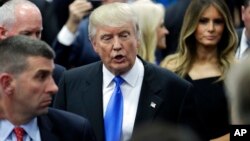"You can vote multiple times on the Time.com poll using incognito mode," an anonymous person posted on the 4Chan message board late Monday, following the first debate between U.S. presidential candidates Hillary Clinton and Donald Trump.
The sentence appeared 18 times in a row and was posted at least twice in a row on a message thread devoted to support of Donald Trump. A notice attached to the thread says, "Posts supporting other candidates will be removed."
Other messages in the same thread said, "You can also vote with [sic] multiple times by voting with different browsers" and "We are losing CSNBC One. You can vote multiple times in incognito. Get on it now, f*ggots."
On Tuesday, Trump cited a number of online polls from right-wing sources that said he had won Monday night's debate.
"Such a great honor," he tweeted.
None of the polls he cited were from mainstream sources using scientifically approved polling methods.
In fact, major research companies, the ones media outlets traditionally team up with to ensure scientifically sound poll results, found a majority of their respondents cited Clinton as the winner of the debate.
Evaluate with caution
Experts say this is an example of why online polls should be viewed with caution. While there are multitudes of surveys on the internet, not all adhere to the same rigorous standards as the polling agencies that have been taking the public temperature for years.
CNN and international market research agency ORC polled 521 debate-watchers Monday and found 62 percent of them thought Clinton had won, compared with 27 percent for Trump.
Three other polls by large research companies, all sampling more than 1,000 U.S. voters, indicated the majority of their respondents thought Clinton was the winner. PublicPolicyPolling said Clinton got 51 percent to Trump's 40 percent in its post-debate poll. A Politico/Morning Consult poll showed 49 percent for Clinton and 26 percent for Trump. And YouGov, an international market research firm, said 57 percent of its respondents picked Clinton, while 30 percent called Trump the winner.
Matt Dallek, a professor at George Washington University's Graduate School of Political Management, said, "Anything I've seen with legitimacy shows that she [Clinton] won and won pretty handily. And that includes focus groups of undecided voters in swing states."
Of Trump's tweet about the polls he won, Dallek said: "There are all different kinds of post-debate polls. Some of them, I think, are pretty worthless." He said he hadn't seen any kind of "reliable polling data, or even focus group responses," showing that a majority of people thought Trump won Monday's debate.
Compare multiple polls
Courtney Kennedy, director of survey research at the Pew Research Center in Washington, suggested looking at multiple polls for a more accurate overall picture.
"Don't hang your hat on any one poll," she said. "We're all reliant on sampling. So just by chance, one individual poll could be off. ... If there's a real trend in the population, multiple polls should be picking up on that."
Canadian journalist and former politician Ian Chadwick has written about the folly of online polling. He said it was important to find out how an organization found its respondents and whether they volunteered to respond or were part of a scientifically selected random sample.
"In unscientific polls," he wrote in 2013, "the person picks himself to participate," ensuring that the sample will not be random at all.
In an email Wednesday, Chadwick elaborated. He said the danger of generating unscientific polls, and of publishing or citing them, was "truth, or rather, the lack of it. Since there is no way to verify the accuracy in all but the most stringent polls, it is basically publishing a falsehood."
He continued, "It is as easy to hack a simple internet poll or populate the responses with 'bots as it is to create fake Twitter feeds. ... Polling is a science, not a handicraft. It should not be confused with coffee shop chatter."
Meanwhile Wednesday, Clinton's Twitter feed steered clear of the online poll issue. Instead, she reminded her followers to make sure they're registered to vote in November's presidential election.





